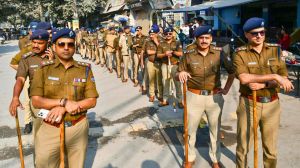Arvind Kejriwal released on interim bail: the case so far, what now
The Delhi Chief Minister was arrested on March 21 by the Enforcement Directorate (ED), due to his alleged connection to the Delhi excise policy case.
 Kejriwal leaving from the Rouse Avenue Court in the excise policy-linked money laundering case, in New Delhi. (PTI Photo/Atul Yadav)
Kejriwal leaving from the Rouse Avenue Court in the excise policy-linked money laundering case, in New Delhi. (PTI Photo/Atul Yadav)The Supreme Court (SC) granted interim bail to Delhi Chief Minister Arvind Kejriwal on May 10.
The Delhi Chief Minister was arrested on March 21 by the Enforcement Directorate (ED), due to his alleged connection to the Delhi excise policy case. This made him the first sitting chief minister in India to be put behind bars.
Why was Kejriwal arrested? What has led to his release? And what now?
Arrest, allegations, and bail rejections
Between November 2, 2023 and March 21, 2024 the Delhi Chief Minister skipped 9 summons issued by the ED in connection to the excise policy case. In the last instance, Kejriwal filed a petition at the Delhi High Court seeking directions for “no coercive action” to be taken against him by the ED in connection with the case. However, the bench comprising Justices Suresh Kumar Kait and Manoj Jain stated that it was not inclined to grant protection “at this stage”.
Hours after the hearing, the ED entered Kejriwal’s home and arrested him. Shortly afterward, on March 22, he was produced before a Delhi court which remanded him to ED custody till March 28. The ED claimed that Kejriwal was the “kingpin and key conspirator on the Delhi excise scam” in which multiple AAP leaders have been accused of receiving kickbacks from liquor businessmen in exchange for favors. This custody was extended on multiple occasions, most recently on May 7, when it was extended till May 20.
Meanwhile, the Delhi High Court rejected his petition challenging the arrest on April 9, leading to Kejriwal to approach the SC on April 10. The case was heard by a bench comprising Justices Sanjiv Khanna and Dipankar Datta.
Supreme Court hearing and interim bail
At the SC, Senior Advocate Abhishek Manu Singhvi appeared on behalf of the Delhi CM and argued that there was no need to arrest Kejriwal as none of the key documents “even remotely” connected Kejriwal to the excise scam. Singhvi also questioned the timing of Kejriwal’s arrest, considering that he was arrested in March 2024 even though the allegedly incriminating statements that the ED were relying upon to justify the arrest were all made between December 2022 and July 2023. Singhvi requested the bench to grant interim bail till June 4, when the election results would be announced.
The apex court on May 3 first expressed an inclination to grant bail to Kejriwal, mentioning the fact that he was an elected Chief Minister as opposed to a habitual offender, while also making mention of the general elections. However, during the May 7 hearing the Bench clarified that if Kejriwal was released on interim bail, it would be conditional upon him not being allowed to perform his official duties as Delhi Chief Minister.
Solicitor General Tushar Mehta and Additional Solicitor General S V Raju argued against releasing Kejriwal on interim bail, cautioning against setting a precedent for politicians being released on bail to conduct campaign activities. Mehta argued that politicians could not be favoured compared to other litigants. Further, he argued that such an order could have larger implications, mentioning the case of Amrit Pal Singh, leader of pro-Khalistani outfit Waris de Punjab, who has expressed his intention to contest elections despite currently being imprisoned. He too is seeking bail at the moment.
The Bench on May 10 decided to grant Kejriwal interim bail until June 1, the day that voting for the 2024 Lok Sabha elections will close. The SC rejected the argument that granting interim bail to Kejriwal would place politicians in a “benefic” position compared to other citizens, stating that the courts “always take into consideration the peculiarities associated with the person in question and the surrounding circumstances”. In this instance, the court noted that the General Elections is the most “significant and important event this year” and are of “prodigious importance”.
Bail conditions, CBI investigation
The Court has, however, placed certain conditions for Kejriwal’s interim bail. It has directed that “he shall not visit the Office of the Chief Minister and the Delhi Secretariat” or sign any official files unless it is “required and necessary for obtaining clearance/ approval of the Lieutenant Governor of Delhi”.
Kejriwal has also been restrained from making comments regarding his role in the excise scam case, interacting with any of the witnesses, or accessing any of the official case files.
Notably, apart from the ongoing ED investigation into the money laundering aspect of the Delhi excise policy scam, the Central Bureau of Investigation (CBI) is running a parallel investigation into the same. It was in relation to this investigation that former Delhi Deputy Chief Minister Manish Sisodia was arrested in February 2023, and Kejriwal was questioned for over 9 hours by the CBI in connection with the case in April 2023.


- 01
- 02
- 03
- 04
- 05




































